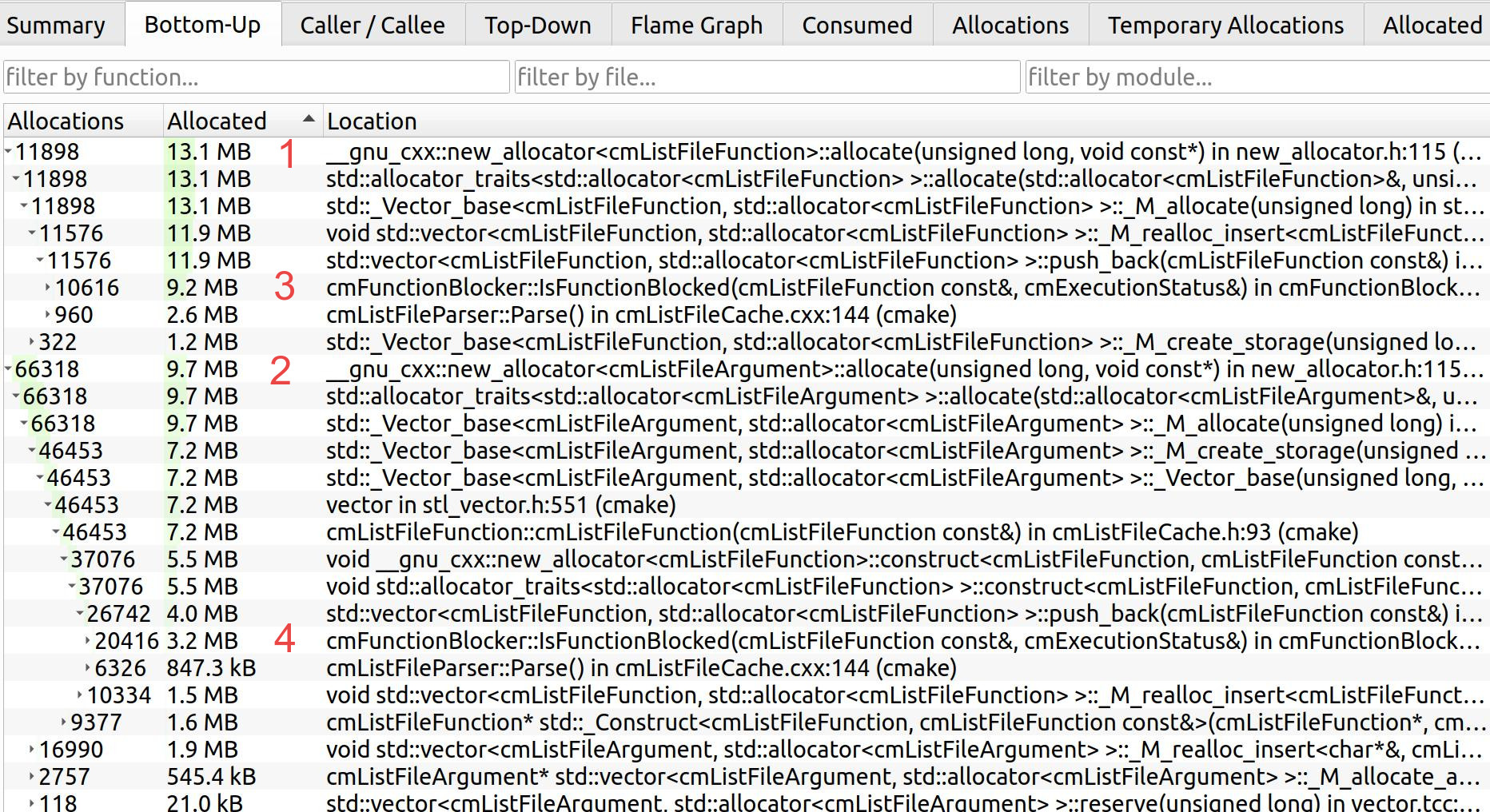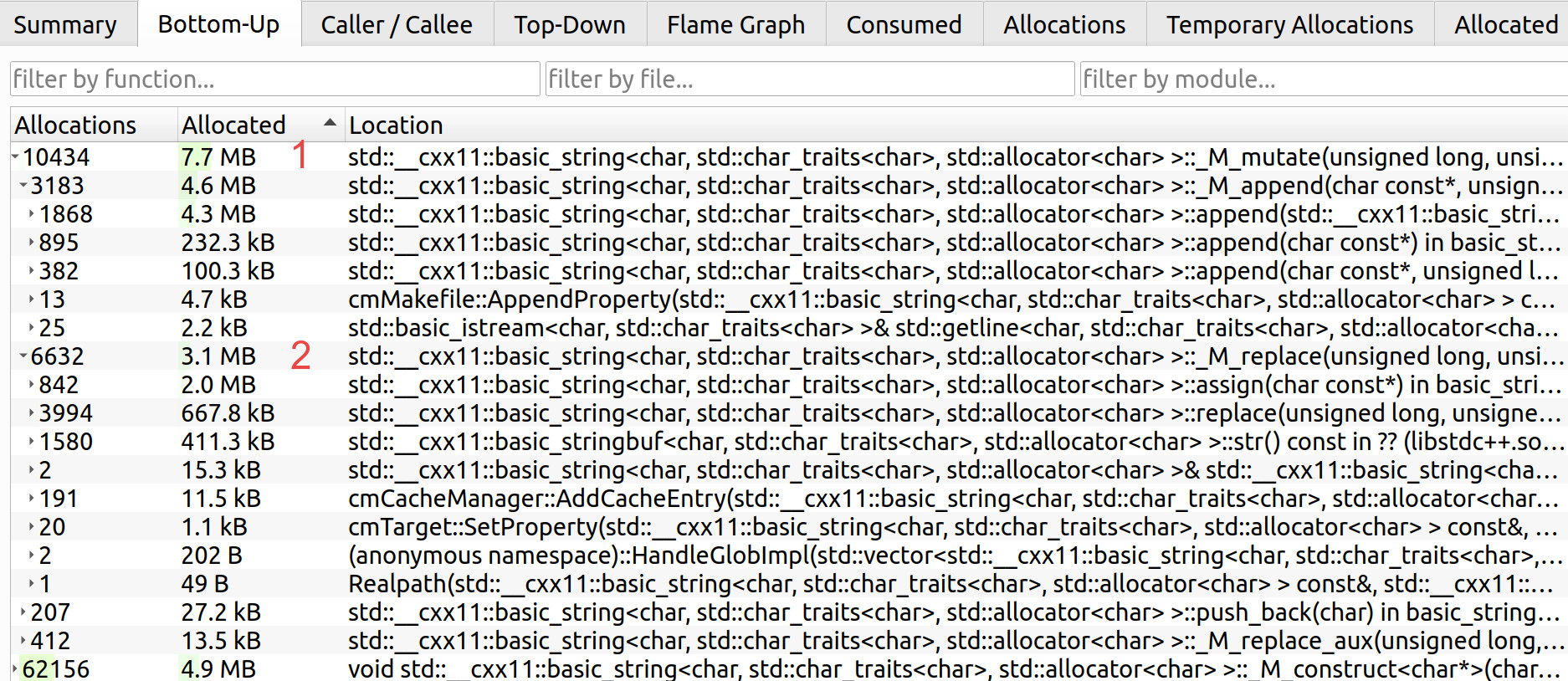Reducing CMake heap usage with Heaptrack
Introduction
While working on previous CMake experiment I noticed several places that looked suspiciously suboptimal. As in case of any performance considerations everything should be measured so I decided to run it through a Heaptrack and check what’s going on.
Clean run
I used Heaptrack 1.2.80, CMake 3.18.1 with debug symbols and this barely empty CMakeLists.txt:
cmake_minimum_required(VERSION 3.17)
project(empty)
Let’s take a look at what heaptrack gave us:

I don’t expand all entries but you can see that top two heap consumers(1 and 2)
are related to std::vector<cmListFileFunction> and
std::vector<cmListFileArgument> operations which in turn stem from
cmFunctionBlocker::IsFunctionBlocked()(3 and 4). This is exactly what I
expected. Now let’s look at these types and their role.
Representation
These types are used to represent parsed code. Here are their simplified definitions:
// command argument representation
struct cmListFileArgument
{
std::string value; // argument itself
Delimiter delim; // argument's type: quoted/unquoted/bracket
long line; // argument's position
};
// command representation
struct cmListFileFunction
{
std::string nameLower;
std::string nameOriginal;
long line;
std::vector<cmListFileArgument> arguments;
};
// file representation
struct cmListFile
{
std::vector<cmListFileFunction> functions;
};
For example, representation for this code
Find_Package(Boost 1.41.0 COMPONENTS system filesystem iostreams)
would be
cmListFile
{
std::vector<cmListFileFunction>
{
cmListFileFunction
{
std::string{"find_package"},
std::string{"Find_Package"},
long{1},
std::vector<cmListFileArgument>
{
{std::string{"Boost"}, Unquoted, long{1}},
{std::string{"1.41.0"}, Unquoted, long{1}},
{std::string{"COMPONENTS"}, Unquoted, long{1}},
{std::string{"system"}, Unquoted, long{1}},
{std::string{"filesystem"}, Unquoted, long{1}},
{std::string{"iostreams"}, Unquoted, long{1}},
}
}
}
};
When the file is parsed, cmListFile contains all its commands. After, they
will be executed in a row.
Function blocker
Everything in CMake is a command including things like functions, conditionals
and cycles. Hence, it needs a way to represent a scope,
e.g. it can’t just execute a function body on its first occurence. Instead, it
needs to collect function’s
inner commands as its body and create a new function definition. To achieve that CMake
has function blocker which has that IsFunctionBlocked() function:
class cmFunctionBlocker
{
public:
bool IsFunctionBlocked(cmListFileFunction const& function)
{
//...
function.push_back(function); // copy!
return true;
}
//...
private:
std::vector<cmListFileFunction> functions;
};
When starting command(e.g. function(), if()) is executed, it starts
to collect scope body using IsFunctionBlocked() and when ending command(endfunction(), endif()) is
met, it does something with its body. The important moment here: once the body is
collected, it will never be modified.
The problem
As you can see it copies functions inside. Consider how this simple code would be represented:
function(f)
# function() block
if(${var})
# if() block
message("hello world")
endif()
endfunction()
f()
Here’s how it’s stored in memory:
cmListFile- stores commands at lines [1; 9] (ranges are closed)function() blocker- stores commands at lines [2; 6]if() blocker- stores commands at lines [4; 5]
That’s the problem, blockers copy same commands multiple times depending on the code structure. It’s quite expensive because each command contains two strings (for its name) and a vector of strings(for arguments). Moreover, it does it multiple times. Inner blocker are populated each time outer one is executed. In the above example, if-blocker will be recreated again on each f() call.
Solution
My first thought was to store raw pointers in blockers but it doesn’t work. When
it reads dependent file(via include()) it really needs to copy cmListFileFunction
because corresponding cmListFile is destroyed after parsing but we still need
to use included functions. So the actual
solution is to store each command in a std::shared_ptr to make copy cheap:
// old cmListFileFunction
struct cmListFileFunctionImpl
{
std::string nameLower;
std::string nameOriginal;
long line;
std::vector<cmListFileArgument> arguments;
};
using cmListFileFunction = std::shared_ptr<cmListFileFunctionImpl>;
Another little problem
Second place where it does unnecessary copy of commands is in
ExecuteCommand() function. Although it’s not critical, I still think obviously
unneeded copy operations should be avoided.
using Command = std::function<bool(std::vector<cmListFileArgument> const&)>;
std::map<std::string, Command> RegisteredCommands;
Command GetCommandByExactName(std::string const& name);
bool ExecuteCommand(const cmListFileFunction& function)
{
//...
if (auto command = GetCommandByExactName(function.nameLower)) // copy!
{
// execute
command(function.arguments);
}
//...
}
As you can see, commands are stored in a std::function and during
execution that object is copied. Why? Because commands could be redefined, thus
currently executing function object might be reassigned and the following
execution would be UB if it’s not stored anywhere.
Copy of std::function usually involves copy of its control block where the
actual Callable is stored. Most built-in commands in CMake are stored as a raw
function pointers so their copy is relatively cheap. But user-defined functions
(function()/endfunction()) contains a vector of commands in its blocker and its copy is not cheap.
Again, solution is to use std::shared_ptr:
using CommandPtr = std::shared_ptr<Command>;
std::map<std::string, CommandPtr> RegisteredCommands;
CommandPtr GetCommandByExactName(std::string const& name);
No more excessive copies of vectors of strings. Both solutions could be even
better with something like boost::local_shared_ptr which avoids synchronization
overhead.
Optimized run
Let’s measure those changes.

Now top heap consumers(1 and 2) are related to std::string operations. Some of
them also could be fixed but it requires more effort to get significant
improvement.
Total bytes allocation decreased from 65MB to 39MB. Number of allocations
decreased from 394k to 280k.
For more complex configurations the economy is of course lower. Partly because there’s an old parsing routine that allocates a lot and becomes the major memory consumer(I’ve fixed them in the next post). Here are results for heaptrack itself and Google benchmark configuration step (total allocated bytes (number of allocations)).
Heaptrack:
- before 305 MB (1308k)
- after 268 MB (1148k)
Google benchmark:
- before: 233 MB (1344k)
- after: 196 MB (1190k)
Conclusion
I’m not a fan of deep optimizations in a project like CMake where resources are not scarce and actual execution is rare. However, in this case it’s not really an optimization, just avoidance of unneeded copy operations, just the C++ way of doing things.